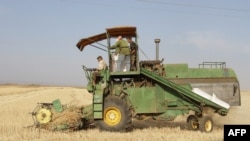GENEVA —
The World Food Program is warning a looming drought in conflict-ridden Syria could put millions of lives at risk. A special WFP report published Tuesday focuses on the likely impact of a potential drought.
Syria suffered a severe drought in 2008, which persisted into 2010. Vulnerable communities in affected areas of the country barely had a chance to recover from food shortages and rising prices arising from this event before it was plunged into war in 2011.
The World Food Program warns the potential impact of a looming drought hitting the northwest of Syria could seriously affect the next cereal harvest. It says 6.5 million people could be at risk of acute food shortages and they will need international aid to survive.
WFP Spokeswoman Elizabeth Byrs tells VOA rainfall since September has been less than half the long-term average.
“There is only one month left in the rainfall season that lasts until mid-May and with three quarters of the rainfall season gone, it is unlikely there will be a significant recovery in this agricultural season," she said. "... I am just saying that the situation is of concern because it will add another problem on top of the conflict consequence impact for the people who already need urgent life-saving assistance.”
The WFP Special Focus Syria report finds dry conditions affecting the wider Middle East will compound the impact of the civil war on the agricultural sector. The report says the northwest of the country, in particular the Aleppo, Idleb and Hama governorates, are the worst affected. These areas account for nearly half of Syrian wheat production.
The report notes livestock also will suffer from water shortages and the lack of grazing land.
A U.N. refugee agency spokeswoman, Fatoumata Lejeune-Kaba, says a major drought could lead to more displacement.
“We can expect more refugees to leave if, on top of the conflict, they feel that their lives are in danger because there is no food," said Lejeune-Kaba. "But it is hard to say obviously how many, because they could also move to other parts of Syria.”
The World Food Program says it hopes to reach 4.2 million displaced people in Syria with food assistance in April. But it notes it is short of cash, so beneficiaries this month will have their food rations cut by 16 percent. The agency says it requires about $41 million every week to meet the food needs of people affected by the conflict in Syria.
Syria suffered a severe drought in 2008, which persisted into 2010. Vulnerable communities in affected areas of the country barely had a chance to recover from food shortages and rising prices arising from this event before it was plunged into war in 2011.
The World Food Program warns the potential impact of a looming drought hitting the northwest of Syria could seriously affect the next cereal harvest. It says 6.5 million people could be at risk of acute food shortages and they will need international aid to survive.
WFP Spokeswoman Elizabeth Byrs tells VOA rainfall since September has been less than half the long-term average.
“There is only one month left in the rainfall season that lasts until mid-May and with three quarters of the rainfall season gone, it is unlikely there will be a significant recovery in this agricultural season," she said. "... I am just saying that the situation is of concern because it will add another problem on top of the conflict consequence impact for the people who already need urgent life-saving assistance.”
The WFP Special Focus Syria report finds dry conditions affecting the wider Middle East will compound the impact of the civil war on the agricultural sector. The report says the northwest of the country, in particular the Aleppo, Idleb and Hama governorates, are the worst affected. These areas account for nearly half of Syrian wheat production.
The report notes livestock also will suffer from water shortages and the lack of grazing land.
A U.N. refugee agency spokeswoman, Fatoumata Lejeune-Kaba, says a major drought could lead to more displacement.
“We can expect more refugees to leave if, on top of the conflict, they feel that their lives are in danger because there is no food," said Lejeune-Kaba. "But it is hard to say obviously how many, because they could also move to other parts of Syria.”
The World Food Program says it hopes to reach 4.2 million displaced people in Syria with food assistance in April. But it notes it is short of cash, so beneficiaries this month will have their food rations cut by 16 percent. The agency says it requires about $41 million every week to meet the food needs of people affected by the conflict in Syria.

